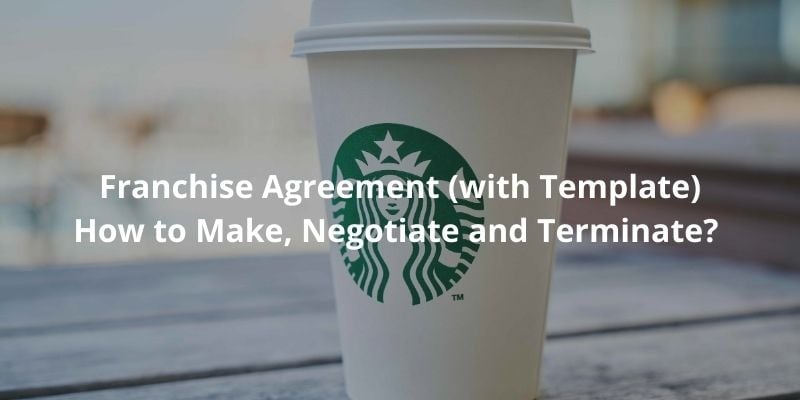Franchising 101: A Step-by-Step Guide on How to Create, Negotiate, and Terminate a Franchise Agreement
24 Nov 2023
7 Oct 2020
min read

Do you want to own a franchise? If so, you will need to enter a franchise agreement. Franchise agreements are legally binding agreements in which the franchisee is given the legal right to establish a franchised outlet/business. Franchise agreements are drafted by the franchisor, and the franchisee is given a template to sign. However, whilst the drafting is in the franchisor’s control, the franchise agreement is not set in stone and can be negotiated by the franchisee depending on the relative negotiation power or balance between the parties.
We will be going over the important components of a franchise agreement and how it can be negotiated by the parties. We will also explain how a franchise agreement can be terminated or exited by the franchisee. Make sure you read until the end, as we will be providing customisable samples of the franchise agreement.
A. What is a Franchise?
First and foremost, what is a franchise?
A franchise is a distribution method involving a franchisor's products or services, which has an established trademark or brand name and a business system. To establish a franchise, the franchisee pays certain fees and royalties to the franchisor to acquire the right to do business under the franchisor’s brand name and system.
The business of creating and distributing the brand and franchising system by the franchisor is called "franchising".
B. What is a Franchise Agreement?
A franchise agreement is a legally binding agreement that governs the relationship between the franchisor and franchisee. Through the franchise agreement, the franchisor grants the right to franchise its business to the franchisee.
The franchise agreement establishes rights such as territory, term, minimum performance, franchise services, fees and payment, training provided, intellectual property rights, use of intellectual property, and other rights/obligations of the franchisee. In addition, the franchisor usually also incorporates an operational manual into the franchise agreement.

C. Types of Franchise Agreement
There are four main types of franchise agreements/arrangements:
1. Single Unit Franchising
Single unit franchising refers to an agreement in which the franchisor grants the franchisee the right to open and operate one premise for the franchise business. Typically, this is the starting point for franchise agreements as it enables the franchisee to test the waters.
2. Multi-Units Franchising
If the initial franchise is successful, the franchisee may seek the right to open and operate multiple franchised premises.
3. Territorial Development
This is a form of multi-unit franchising in which the franchisee is given a territory to develop a certain number of units within a period. The arrangement is exclusive, which means no other franchisee can be granted the same territory during this time. However, the franchisee may lose its exclusivity if it fails to meet certain milestones in developing the territory as required under the franchise agreement.
4. Master Franchise
A master franchise is an expanded type of territorial development franchise where the franchisee not only has the right to operate franchise units in the territory but to sell the franchise rights to others in the territory. In this sense, the master franchisee is a sub-franchisor, bearing many rights and responsibilities of the franchisor to the franchise unit in the territory, such as providing support and training in the territory. As a sub-franchisor, the master franchisee collects fees and royalties from franchisees in the territory.

D. How does a Franchise Agreement work?
1. For the Franchisor
The franchise agreement is the most important legal document as it enables the franchisor to manage and define the legal relationship between the franchisor and the franchisee. Through the agreement, the franchisor can grant the franchisee the legal right to establish and develop their franchise position; in turn, the franchisee will assume the obligation of establishing and maintaining its franchise business in compliance with the requirements of the system set by the franchisor (as set out in the operational manual). The franchisee is also required to pay franchise fees and ongoing royalties to the franchisor.
2. For the Franchisee
As an investor in the franchise business, the franchisee should ensure that the franchise agreement includes all promises and representations from the franchisor. The franchisee should also ensure that it details the proper assistance, support, and training he will receive from the franchisor to help the franchisee set up and run the franchise business successfully.
E. Contents of Franchise Agreement
A typical franchise agreement contains the following clauses:
1. Grant and Reservation
The franchise agreement typically begins with a grant of the franchise and any reservations by the franchisor. The franchised right is usually a limited, non-transferable, non-exclusive right to use the franchisor’s name, trademark, logo, and other intellectual property subject to the following restrictions:
-
It is a franchised business;
-
It is being used at and from the premises;
-
It is within the territory;
-
It is under the permitted name/trademark; and
-
It is used following the system and the operating manual of the franchisor.
2. Term and Minimum Requirements
The franchise agreement should set out the minimum requirements and milestones for the franchisee to meet within the period in the territory. This could include, for example, the number of locations to be opened, the plan of the unit to be approved, the minimum sales target, etc. This section may also specify other equipment or information technology systems that must be installed as an operational requirement.
3. Franchise Fees and Royalties
Another important item to set out in the franchise agreement is the number of initial franchise fees and ongoing royalties to be paid by the franchisee to the franchisor. In addition, there may be other expenses such as training fees or advertising fees, which are to be borne by the franchisee.
4. Services to be provided by the Franchisor
In exchange for the various franchisee fees, royalties and expenses, the franchisor should provide certain services to the franchisee, including assistance with the setup/opening of the franchise, advising on the plan layout and equipment, training staff, supply of goods, seminars, post-opening services, marketing, etc.
5. Intellectual Property
The franchised right granted is a license to the franchisee and not a transfer of ownership right over the intellectual property by the franchisor. The franchisor will therefore have to define each item of its proprietary intellectual property, confidential information and trade secrets in detail and explain the restrictions on the franchisee's right to use them in the franchised business. This is important for the franchisor to protect the brand value of its business.
6. Quality Control
The franchisor will usually specify certain quality control requirements for the franchisee to comply with. This is necessary to maintain the quality of the brand and ensure that the goods and services provided by the franchisee meet the minimum standards of the franchisor.
7. Sale of Franchised Business
The right of assignment in most franchise agreements is restricted and would require the franchisee to seek the consent of the franchisor before the franchise can be sold or assigned. In many cases, the franchisor is given the right of first refusal to acquire the business on the same terms and price as the third-party purchaser.
8. Restrictions on Franchisee
The franchise agreement will generally include certain restrictions on the franchisee, including a prohibition on the franchisee from opening a competing business with the franchise business in the territory.
Other restrictions on franchisees may include:
-
not to commence operating the business until the franchisor’s approval;
-
not to operate the business at any location other than the approved premises;
-
not to sell, assign, transfer, charge or sub‑license the business;
-
not to use or publish any advertisements without the franchisor’s approval;
-
not to conduct business outside the territory;
These restrictions usually last for at least one year after the termination of the agreement.
9. Relationship between the Parties
This is a common clause that clarifies the relationship between the parties in the franchise agreement. Note that the franchisee is not an agent, employee, or partner of the franchisor but an independent contractor. This means the franchisee is responsible to pay taxes, conduct his own business, and hold full responsibility for its employees and insurance.
10. Breach of Contract Limitation of Liability
Most franchise agreements (in favour of the franchisor) limit the liability of the franchisor in the case of a breach of contract. However, the liability of the franchisee tends to be unlimited. In addition, the franchisee will indemnify/compensate the franchisor for any losses suffered arising from the breach of contract by the franchisee. While this may seem unfair on the surface, it is not necessarily so, as the franchisee is responsible for the daily operation and maintenance of the business, not the franchisor.
11. Termination of Franchise Agreement
Depending on the ‘seriousness of the breach (whether the breach goes to the root of the contract), a breach of contract may not allow the innocent party to terminate the contract. For more details, please refer to our blog post on this subject - https://docpro.com/blog/terminate-contract-breach
The parties may also list other events which trigger a termination of the franchise agreement, for instance, if there is a material change in the management ownership/control of the franchisee, if parties become insolvent, if the franchisee is given a cooling-off period, or if there is a change of mind without reason.
12. Governing Law and Dispute Resolution
The franchise agreement will stipulate the governing law undermining the contract; this is normally the law of the territory of the franchised business (where the dispute has arisen). For dispute resolution between the franchisor and the franchisee, the parties typically agree to a face-to-face meeting or mediation before resorting to court or arbitration.
Negotiation between the parties tends to be the quickest and most inexpensive way to resolve a dispute, followed by mediation and arbitration. Going to court is the most expensive and can drag on for years.
13. Boilerplate Clauses
A typical franchise agreement template would also include sample boilerplate clauses that can be found in most agreements. For example, no assignment, reservation of rights, waiver, severability, notices, force majeure, entire agreement, amendments, and rights of third party, etc.
For a comprehensive list of boilerplate clauses, you can check out our customisable document here: https://docpro.com/doc303/general-boilerplate-document-standard-agreement
14. Examples of Franchise Agreement Templates
We created 6 different types of franchise agreement templates, all of which cater for different situations. In addition to the two-party versions between the franchisor and the franchisee, we also created tripartite franchise agreement templates between the franchisor, the franchisee, and the principal, where a principal (usually an individual) guarantees the obligations of the franchisee.
|
Version |
Franchise Agreement (2 Parties) |
Franchise Agreement (with Principal) |
|
Franchisor |
https://docpro.com/doc41/franchise-agreement-with-principal-franchisor |
|
|
Neutral |
https://docpro.com/doc37/franchise-agreement-with-principal-neutral |
|
|
Franchisee |
https://docpro.com/doc42/franchise-agreement-with-principal-franchisee |

F. How to Negotiate a Franchise Agreement?
Most franchisors will tell their franchisees that the franchise agreement is non-negotiable and operates on a take it or leave it basis. This may or may not be true, depending on the relative bargaining power of the franchisor and the franchisee. For example, if the franchisor is McDonald's, then the room for negotiation is very limited compared to a new franchisor that needs franchisees.
The following are the most negotiated terms in franchise agreements:
1. Territorial Restriction
The territorial boundary of the franchise is usually negotiated. It should be clear which city or territory is covered by the franchise, particularly if the franchise is exclusive. Parties should avoid setting a distance as to the limits of the boundaries of the franchise, as this will likely create dispute down the line.
Another restriction that can be negotiated is whether the franchisee is permitted to sell online and whether if the online customer lives outside of the territory, the franchisee can still sell; vice versa, what if another franchisee infringes an exclusive territory, would the franchisee have any recourse against the franchisor?
2. Representations of the Franchisor
The promises, representations and warranties made by the franchisor and relied on by the franchisee should be included in the franchise agreement. If the representation goes to the heart of the contract, it should be treated as a condition that allows the franchise agreement to be terminated if breached. It is also a good defence should the franchisee fails to meet any milestones or targets under the franchise agreement.
3. Restrictions on Franchisees
Most restrictions imposed by the franchise agreement on the franchisee are unduly restrictive. For example, the restriction to set up a competing business in a territory could be unduly wide in terms of area and duration. The franchisee should negotiate with the franchisor on something more reasonable.
4. Property of Assets
The franchise agreement should clarify to who the property rights of various assets or equipment belong. Where these assets or equipment are provided by the franchisor to the franchisee and paid for as part of the franchise fee, ownership and entitlement should be made clear.
5. Timing and Payment of Franchise Fee
The initial franchise fee and ongoing royalty may be negotiable. In addition, if the timing for payment by the franchisee is tight, but the timing of provision of service by the franchisor is loose, the franchisee can seek to negotiate timing to buy more time.
6. Limitation of Liability
Another common unfair term is that the liability of the franchisor is limited, whereas the liability of the franchisee is unlimited, extending to the personal liability of the principal. The franchisee can seek to negotiate a fairer franchise agreement by making these unequal terms reciprocal. For example, if there is a liability cap on the franchisor to the amount of the franchise fee, then the same cap should apply to the franchisee.
7. Right of First Refusal
Should the franchisee wish to exit the franchise through a sale, the franchise agreement generally restricts such sale to be subject to the consent or the first right of refusal of the franchisor (i.e. the franchisor has the right to purchase first the franchise at the same price and terms as the third party). Such consent should not be unreasonably withheld, and any right of first refusal should lapse after a reasonable period.
The franchisee could also seek a right of first refusal to buy out any franchise within its territory based on reciprocity.
8. Breach and Termination of Agreement
Penalties for late payment of franchise fees by the franchisee may be excessive, whereas any breach of the franchisor’s obligations carries little to no penalties. In addition, the termination provisions may provide for termination for a minor breach of contract by the franchisee, whereas the franchisee has no right to terminate against even a major breach by the franchisor. Again, the franchisee should seek to negotiate these provisions with the franchisor to ensure proportionality and fairness in the franchise agreement.
9. Dispute Resolution
If the governing law and jurisdiction of the franchise agreement are selected as the jurisdiction of the franchisor instead of the territory of the franchise (if different), the franchisee should negotiate with the franchisor on this point to ensure that common sense prevails. Given most elements of the disputes are likely to arise from the franchised territory, it is the most convenient forum for dispute resolution.
In addition, the franchisee should ensure that any dispute will be dealt with in a fair, cost-effective, and timely manner, such as first going through high-level negotiation or mediation.
G. How to terminate a Franchise Agreement
Most franchise agreement templates are in favour of the franchisor, which means that the franchisor can terminate the franchise agreement where the franchisee has breached the terms of the franchise agreement (however minor) or failed to meet certain milestones.
However, it is relatively difficult for a franchisee to terminate the agreement without compensating the franchisor with many franchise fees, even if the franchise business is not as successful as expected. Below are some ways franchisees may be able to terminate the franchise agreement early:
1. Breach of Contract
Not every breach of contract by a party gives the other party a right to terminate the franchise agreement. Unless the breach is expressly included as a terminable event in the franchise agreement, the breach will need to be significant enough to be a major breach that goes to the root of the agreement (i.e., breach of a condition of the agreement).
The innocent party should give the defaulting party a reasonable period to remedy the breach, which, upon failure, the innocent party would have the right to terminate the franchise agreement. A minor breach that does not go to the root of the agreement will simply be a breach of a condition and the appropriate remedy damages.
2. Cooling-off Period
In certain jurisdictions, the franchisee is allowed a cooling-off period (7 – 30 days), during which it can terminate the franchise agreement without providing reasons. This is to prevent the franchisee from being lured into an unscrupulous franchise arrangement with long-term payment obligations without thinking it through.
So, this is what you need to know about terminating a franchise agreement:
- How to terminate a franchise during a cooling off period?
With a cooling-off period agreed between Franchisor and Franchisee, either party may terminate the Franchise Agreement without penalty subject to a written notice and payment of outstanding fees to the franchisor[1].
- How to terminate a Franchise Agreement if no cooling-off period is agreed?
In the absence of a cooling off period, a Franchise Agreement can still be terminated with the consent of both parties. There may, however, be costs incurred in this case, so both parties should be prepared for potential liability[2].
3. Sale of Business
If the franchisee wishes to sell its business, the franchisor shall not unreasonably refuse to consent to the sale. The franchise agreement will usually stipulate the conditions for sale, such as the right of first refusal. If the franchisee follows the relevant notice requirements and the franchisor does not exercise its right of first refusal within a particular period, the franchisee is generally free to sell its business.
4. Walking Away without Clause
Either party shouldn't abandon the franchise without a clause even if the franchise business is unsuccessful, as the potential liability could be even bigger (like breaking a lease which the landlord could claim for all the unpaid rents under the lease from the tenant). It should only be considered by the franchisee where the liability is limited (if the franchisee is a limited company with no principal guaranteeing its liability on a personal basis, then one could consider walking away and winding up the company).
[1]Andrew Pickett, Trial Attorney, Andrew Pickett Law, PLLC
[2]Andrew Pickett, Trial Attorney, Andrew Pickett Law, PLLC
Please note that this is a general summary of the position under common law and does not constitute legal advice. As the laws of each jurisdiction may be different, you may want to speak to your lawyer.
Keywords:
